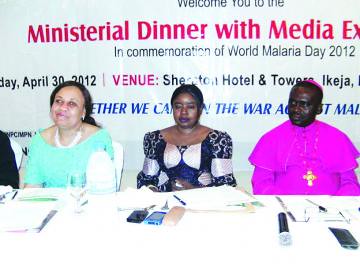
Mrs. Amajoh (left), Mrs. Bamidele and Bishop Sunday Onuoha at the dinner in the Federal Republic of Nigeria., a photo by Pan-African News Wire File Photos on Flickr.
Nigeria leads in maternal death globally, says minister
By Augustine Ehikioya, Abuja
Nigerian Nation
•From left to right: Mrs Amajoh, Mrs Bamidele and Bishop Sunday Onuoha at the dinner.
NIGERIA accounts for 23 per cent of global malaria burden, with maternal mortality topping the table, Health Minister Prof Onyebuchi Chukwu has said.
This figure is about a quarter of the world’s.
Chukwu, who spoke at a dinner in Lagos for reporters to mark World Malaria Day, said 47 per cent of the global malaria burden came from five countries. They are Nigeria, Democratic Repulic of Congo, Ethiopia, Tanzania and Kenya. Nigeria has one of the highest maternal mortality ratios.
Represented by the Permanent Secretary, Federal Ministry of Health, Mrs Fatima Bamidele, the minister said malaria, according to National Demographic Health Survey (NDHS), constitutes about 11 per cent of Nigeria’s maternal mortality of 545 per 100,000 while infant and childhood death rates are 25 and 30 per cent.
The disease, he added, has become a problem to Nigeria despite that it could be easily prevented, treated and cured.
Chukwu said the country has introduced various measures on roll back malaria (RBM), like the disease management, Insecticide Treated Nets (ITNs) and Malaria in pregnancy among others.
The Federal Government distributed 46.8 million Long Lasting Insecticide Nets (LLINs) in 30 states. It has also scaled up the use of Indoor Residual Spraying (IRS) and larviciding and massive distribution of anti-malaria medicines and commodities. The government has built capacity for health workers at national and state levels, among others.
Chukwu said malaria deaths have been reduced by one-third in the last 10 years in Africa, adding that the Malaria Household Survey conducted in 2010 in nine states – Kano, Jigawa, Bauchi, Gombe and Kaduna in the north and Anmbra, Akwa Ibom and Rivers in the south showed an increase in the percentage of households with at least one LLIN from 2.2 to 88 per cent.
"There was also an increase in the percentage of children under-five years, who sleep under nets the night before the survey from three to 44 per cent. Also, there was an increase in the percentage of children under-five years with fever treated with an effective anti-malaria within 24 hours from onset of the symptoms from 0.0 to 5.8 per cent and increase in the number of expectant mothers, who received two or more doses of IPT from nine to 16.6 per cent," he added.
He said stakeholders and partners should ensure that Nigerians sleep under LLINs and those infected by the disease treated with artemisinin-based combination therapy (ACTs) with sulphadoxine pyrimethamine after the 16th week to protect the mother and the unborn child from the disease.
He urged the private sector and individuals to invest in malaria control.
He said about 100 million cases of the disease are reported yearly, adding that this was because of inadequate and late release of funds for malaria control.
Chukwu said the disease accounts for six out of 10 out-patient visits and three out of 10 admissions in health facilities.
He said: "N480 billion is lost to malaria yearly by Nigerians due to out-of pocket treatment and prevention costs. It is also responsible for loss of man-hours at work and school. This could pay the yearly salary of 2.2 million workers.
Co-ordinator, National Malaria Control Programme (NMCP), Mrs Chioma Amajoh, said the ministry programme on malaria has been supported by ExxonMobil with over $110million reaching almost 66 million people, thereby reducing malaria by 33 per cent in Africa.
She said the Federal Government has been investing in partnership to rid the country of the disease.
"Malaria is still one of the world’s biggest killers, claiming about 655,000 lives yearly. Research shows that malaria robs Africa of more than $12 billion in lost productivity yearly and accounts for about 40 per cent of health expenditure," she added.
She said the country has made progress in controlling the disease with the distribution of two bed nets per household to reach 60 per cent of its target. The improvement in treatment is laudable. The removal of tariff on bed nets, malaria treatments and rapid diagnostic tests is also a great achivevement, she added.
No comments:
Post a Comment